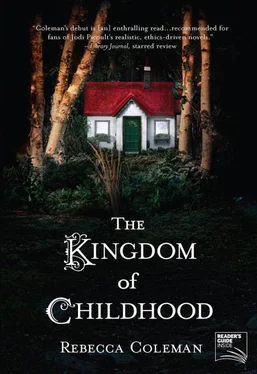Her foot retreated, and she pushed it down into its shoe. He shifted back into his seat and combed his hair over his eyes. As the engine turned over, he said, “Sorry.”
“No problem,” she said, and crazily, her voice was light and pleasant. “So. There’s a box of woolen sheep in my closet that need price stickers. You can come by and get them tomorrow afternoon.”
“Come by your classroom, you mean?”
“Sure.” She turned her face toward him and smiled, as though nothing had transpired. “I don’t see why not.”
During our second year of college, long before either Bobbie or I had heard about a thing called Waldorf school or realized we would make a little life together teaching in one, we shared a dormitory room decorated with my Last Tango in Paris poster and her collection of monkeys of all kinds—plush, balsa wood, jade, coconut shell, cartoon. Her late mother had sewed her two matching twin-sized quilts covered in tiny rosettes of calico, and these we spread on our beds on opposite sides of the little room. The year before, our schedules had been nearly identical—we were both elementary education majors. Sophomore year we had no classes together, but shared two of the same professors, one of whom had something of a reputation.
“He’s a lech,” Bobbie warned me early in the spring. “One of my friends had him last year. He’ll try to make you buy your A.”
“With what?”
“Blankets and beads. What do you think? If you go to talk to him, keep a good distance.” She gestured a wide arc around her body. “Room for the Holy Ghost, as the nuns used to say. Or else he tries to do that trick on you like your mother probably did with the cantaloupe.”
My mother had never done that trick with the cantaloupe, but I had an idea of what she meant. “What if he scoots in and does it anyway?” I asked. “He’s the professor,” I added, because at that point in my life I had not yet attended enough Women’s Lib rallies to understand I was a little behind the times.
“Kick him in the balls,” she suggested.
I laughed rather hysterically. “I could never do that,” I told her. It was not that I didn’t understand revenge. I did, and quite well; perhaps too well. The type that came easily to me was that which was quiet, which comes from the side, which might seem, through squinted eyes, like an act of God. What I could not imagine was the sort of violence where one looks another person in the eye and watches him suffer. It seemed barbaric, and more importantly, not my style.
I had thought about that when Zach stroked my foot as it rested on his thigh, massaging its inside arch between his thumb and index finger like my breast in that professor’s hand. I hadn’t kicked that man as Bobbie instructed. But I was older now, and I knew there existed more interesting varieties of pain than a knee planted in the groin. There was the kind that shut down all pleasure, and the kind that came folded in with it.
By the time I returned home from our Starbucks trip I felt confident and a little victorious. With Scott out with his girlfriend and Russ still at the office, I ascended the stairs to my room, dragging behind me the suitcase from Ohio that had been sitting in the dining room since my return. In a month or so Russ would be flying to Iceland for a research trip, and as much as I avoided his office at all costs, I would be considerate enough to finally reunite it with the others in the set so he wouldn’t have to hunt for the right size. The door creaked on its hinges and I shied back, as if he were home to hear me. Straight back was the old sofa, sagging in the center of each cushion; beside it sat a pile of professional journals marked with yellow sticky notes. Against the windowless wall stood a battered desk the color of milky coffee, his computer in the center like a one-eyed heathen god perched on its shrine. While his office at the university offered a bit of décor that suggested a higher purpose for the work therein—photos of rugged crab fishermen earning a living, the beauty of nature along the fragile Arctic coast—his home office dispensed with such fripperies. I crossed the dingy carpet to the closet and tugged the largest black suitcase from its spot beneath a copy-paper box and a pile of sweaters.
As I dropped it on its side, it hit the floor with a noisy rattle like a child’s toy instrument. Strange. Unzipping it, I found a plastic grocery bag with the handles all tied together; inside were a jumble of white medication bottles. I tried to remember where they could have come from. Russ’s root canal earlier this year? Or perhaps they had belonged to my mother before her death several years ago, and someone had stuffed them in here after we cleaned out her house? It seemed odd that they were not amber prescription bottles, but the type which sit on a pharmacist’s shelf, large and labeled only with the drug information.
Valium. Xanax. Dexedrine. Nembutal.
I looked up at Russ’s computer, then at the Xanax bottle in my hand. For a moment I just stood there, reading the labels in confusion. Then it slowly dawned on me that these bottles had not been set aside and forgotten. They had been hidden.
I zipped the smaller suitcase inside the larger one and put them properly away. Then I lifted the grocery bag and took the whole mess downstairs, feeling nothing more than a bit of curiosity and a small, germinating seed of anger.
Russ came home just past nine-thirty. He looked surprised to find me seated in the rocking chair by the fireplace, watching the door. Tiny rectangles of light glinted off his glasses as he tipped his head to peer at me over them—progressive lenses were just around the corner for him—but then he dropped his black shoulder bag onto the floor and headed toward the kitchen.
“Russ,” I said, and the dark, syrupy note to my voice caused him to stop and turn.
“I was putting a suitcase away in your office today,” I began, “and I found some things in the closet I think might be yours.”
His reply was hostile. “What were you doing in my office?”
“Putting away a suitcase. I just said that.”
“It’s my office. You shouldn’t be in there.”
“I pay the mortgage, too, dear.”
“Not much of it.”
I hefted the bag from the floor beside me and set it on the coffee table. It had occurred to me that the medications might, in fact, be Scott’s. He was a clever enough kid to hide things in plain sight, and enterprising enough to try it as a business venture. But it could have been either of them, for what did I know of this type of drug use? When I was Scott’s age, drugs didn’t come from a lab. They grew on farms, or in my case, in a series of buckets under Gro-Lites in the root cellar of a house around the corner from the deli.
“That’s not yours,” he said.
“I realize that.”
“ God, Judy,” he said, explosive all of a sudden, his face wrenched, arms flying out at his sides. “I get home from a long day at work and you dump this shit on me. Get a fucking hobby, why don’t you. I work like a dog all day. I don’t need this.”
“So they’re yours, then? Not Scott’s?”
He half turned toward the hallway again and curled his lip at me. “As if you’d be in a position to judge Scott or anybody else. The Queen Stoner herself. Our Lady of Recreational Pharmaceuticals.”
I regarded him with an indifferent glare, and he snatched the bag from the table. “Stay out of my office,” he ordered.
“Better hope you don’t get caught driving on that stuff,” I warned. “I won’t be bailing you out. You can sit and rot for all I care.”
“I wouldn’t call you. Why would I? You haven’t given two shits about me in years. I’d call my lawyer.”
Читать дальше












